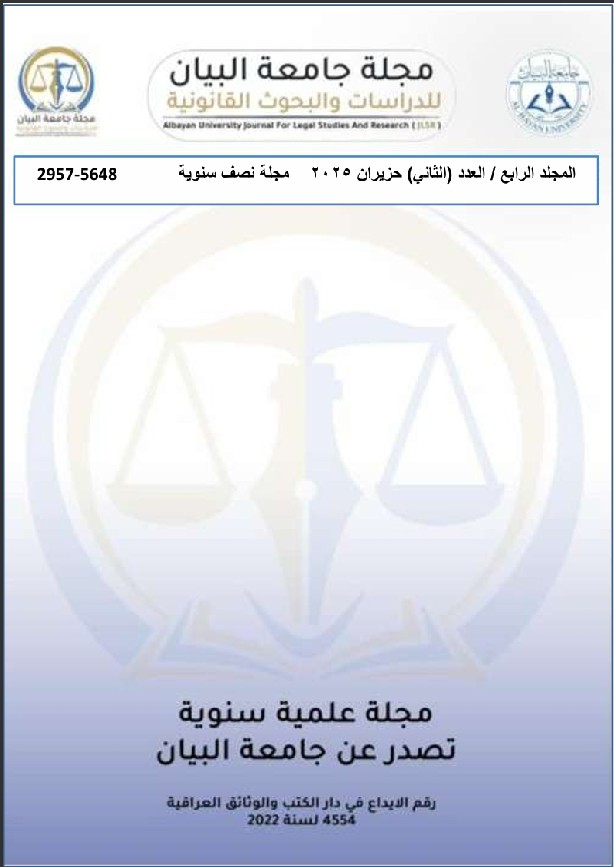Abstract
In this research, we address an important right granted to the accused: the right to remain silent. This right is one of the guarantees granted to the accused, enabling them to defend themselves in the manner they deem best serves their interests. The basic principle of human innocence is that every human being is presumed innocent. In order to highlight this right, we have adopted the comparative approach between Iraqi law and international conventions, with a look at some other legislation, with the intention of clarifying the ambiguity surrounding it, with a statement of its various aspects and points of view related to it, and to clarify the right of the accused to remain silent, and to clarify the right of the accused, and to clarify the right of the accused to remain silent. We have decided to divide the research into two sections, in which we addressed the nature of the right of the accused to remain silent and its guarantees. We learned about the meaning of the rights of the accused and its importance, with a statement of its development. Then we clarified the principle of innocence and the position of the right to equality before the judiciary from that principle, and we concluded this section with the relationship of the principle of innocence to the right of the accused to remain silent. In the beginning, we discussed in the section: the legal basis for the accused\'s right to silence, as we explained the nature of the accused\'s right to silence, and explained the development of that right. In this research, we shed light on the position of the law on that right, and preferred the direction that takes and supports that right, relying on judicial rulings. Then we explained the position of the various legislations on the accused\'s right to silence, in particular: the Iraqi and Egyptian legislators. In the second section, we shed light on the provisions of the accused\'s silence in the stages of the criminal case, explaining the accused\'s right to silence through the different penal systems, which are the investigative system, the accusatory system, and the backward system. We also explained the position of Islamic law on that right. Then, through our study of procedural legal texts, we explained the extent to which the accused enjoys that right during the different stages of the criminal case, whether in the stage of collecting evidence, the stage of the preliminary investigation, or the stage of the final investigation (trial), and we explained the effect of the principle of the freedom of the criminal judge in forming his belief on the accused\'s right to silence .
Abstract
في هذا البحث نتناول حقاً هاماً من الحقوق الممنوحة للشخص موضع الاتهام، باعتباره من ضمن الضمانات الممنوحة للمتهم والتي تكفل له الدفاع عن نفسه، وبالطريقة التي يراها تحقق مصلحته ان الاصل في الانسان البراءة وقد اعتمدنا في سبيل إبراز ذلك الحق، واتباع المنهج المقارن بين كل من القانون العراقي والمواثيق الدولية مع نظرة على بعض التشريعات الأخرى، قاصدين من ذلك توضيح الغموض الذي يشوبه، مع بيان مختلف جوانبه ووجهات النظر المتعلقة به، ولبيان تقيين حق المتهم، ولبيان حق المتهم في الصمت، وقد ارتأينا تقسيم البحث إلى مبحثين ، تناولنا فيه ماهية حق المتهم في الصمت وضماناتها، فتعرفنا على معنى حقوق المتهم وأهمية مع بيان تطوره، ثمَّ أوضحنا مبدأ البراءة وموقف الحق في المساوات أمام القضاء من ذلك المبدأ، وختمنا هذا المبحث بعلاقة مبدأ البراءة بحق المتهم بالصمت، وابتداءً تناولنا في المبحث: الأساس القانوني لحق المتهم بالصمت، إذْ بينا ماهية حق المتهم بالصمت، وبيان تطور ذلك الحق، وقد ألقينا الضوء في هذا البحث على موقف القانون من ذلك الحق، ومرجحين الاتجاه الذي يأخذ ويدعم ذلك الحق، مستندين في ذلك إلى الأحكام القضائية، ثمَّ بينا موقف التشريعات المختلفة من حق المتهم بالصمت وعلى وجه الخصوص: المشرع العراقي والمصري، وسلطنا الضوء في المبحث الثاني التشريعات الحديثة وموقف القضاء والفقة من حق صمت المتهم كما بينا موقف الشريعة الإسلامية من ذلك الحق، ثمَّ أوضحنا من خلال دراستنا للنصوص القانونية الإجرائية مدى تمتع المتهم بذلك الحق خلال المراحل المختلفة للدعوى الجزائية، وأثر مبدأ حرية القاضي الجزائي في تكوين عقيدته على حق المتهم في الصمت. وانتهاءً: وختاماً أتممت البحث بخاتمة مقسمة إلى: نتائج البحث، وإلى جملة من التوصيات التي نوصي بالأخذ بها.
